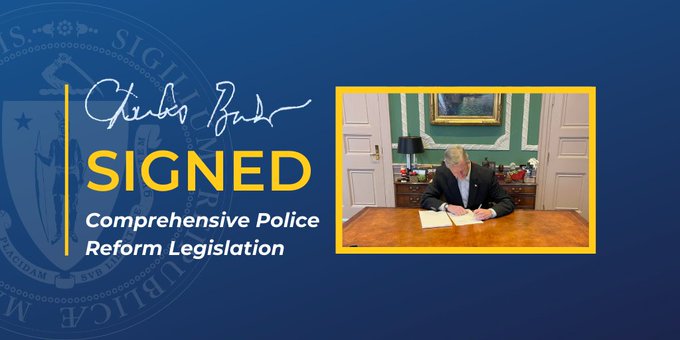
Legislature Passes Policing Reform Legislation
Bill emphasizes police accountability and transparency by creating a new, independent commission; increases de-escalation protocols and puts in place procedures to address structural racism
Today (12/01/20), Senate President Karen E. Spilka and House Speaker Robert A. DeLeo, along with their colleagues in the Senate and House, voted to pass An Act relative to justice, equity and accountability in law enforcement in the Commonwealth. The legislation represents the most comprehensive and intentional legislative response to incidents involving police practices in Massachusetts communities. It creates an independent, civilian-led commission to standardize the certification, training and decertification of police officers, bans the use of chokeholds, limits the use of deadly force, creates a duty to intervene for police officers when witnessing another officer using force beyond what is necessary or reasonable under the circumstances, and takes steps to break the school-to-prison pipeline. It also creates a first-in-the-nation statewide moratorium on biometric surveillance systems, which include facial recognition technology.
"As I've said many times, achieving meaningful police reform and dismantling systemic racism is both a marathon and a sprint," stated Senate President Karen E. Spilka (D-Ashland). "This was the sprint, and I'm very proud of the foundation of justice, equity and accountability that this bill creates. I'm looking forward to getting this bill signed by the Governor so we can begin the marathon and fulfill our promises to those who called on us to meet this moment. I am incredibly grateful to Senators Brownsberger and Chang-Diaz for their incredible work on this bill, to Speaker DeLeo for his partnership, the conferees, all of the legislators, and the advocates and activists who worked with us to get this done."
"Over the summer, we vowed to make change, and, with today's vote, the Legislature acted on its promise to ensure fairness and equality," said House Speaker Robert A. DeLeo (D-Winthrop). "I'm proud of the House conferees, Chair Cronin and Chair of the MBLCC Representative González, for their persistent effort to improve our law enforcement system and for the work of the House as a whole. I'd also like to thank Senate President Spilka, Senators Brownsberger and Chang-Diaz and my colleagues in the Legislature for their action on this crucial bill."
"This is a great package," said Senator Will Brownsberger (D-Belmont), Senate Chair of the Joint Committee on the Judiciary. "It's going to make a real difference in the Commonwealth. I think its accountability and transparency provisions are strong enough to really improve policing."
"This compromise piece of legislation creates, for the first time, an independent agency for the statewide certification of law enforcement officers and establishes uniform training and standards," said Representative Claire Cronin (D-Easton), House Chair of the Joint Committee on the Judiciary. "This legislation is about justice and fairness. Fairness for those that interact with police, and fairness for police as well."
"This is a big day," said MBLLC Member Senator Sonia Chang-Díaz (D-Boston). "This final bill scores meaningful wins for accountability, civilian oversight from communities of color, and a vision of public safety that prioritizes de-escalation over force. This is the first time any state has combined this kind of real oversight authority with meaningful community membership at the table of power. I'm grateful to Senate President Spilka and Speaker DeLeo for their commitment to getting this legislation done this session. And I'm grateful for the Senate President's pledge to continue the focus on racial justice into next session--acknowledging this work extends well beyond law enforcement."
"This is a landmark decision that was demanded by the people and led by Black and Latino Legislators (MBLLC) of this state," said Massachusetts Black and Latino Caucus Chair Representative Carlos González (D-Springfield). "Our demands were agreed to by the Speaker of the House and Senate President. Today we begin to address police accountability and transparency. We are making great strides to address racism in police departments and provide them the adequate training and support to address the daily and difficult challenges they have."
A summary and outline of the bill's provisions is as follows.
The bill creates a Massachusetts Peace Officer Standards and Training Commission (MPOSTC)—an independent state entity, the majority of which is composed of civilians—to standardize the certification, training and decertification of police officers. The commission will have independent power to investigate misconduct and will serve as the civil enforcement agency to certify, restrict, revoke, or suspend certification for officers, agencies and academies, among other duties regarding regulations regarding use of force standards, and the maintenance of a publicly available database of decertified officers. Within the Commission, there will be two divisions: The Division of Police Training and Certification, under the management and control of the newly established Committee on Police Training and Certification, and the Division of Police Standards.
The bill establishes strong guardrails governing the use of force, prohibiting certain actions and requiring the use of de-escalation tactics. The Committee on Police Training and Certification will promulgate regulations for use of force standards in areas including the use of physical or deadly force, the discharge of a firearm into a fleeing motor vehicle and the use of tear gas, rubber pellets and dogs. The legislation also bans the use of chokeholds.
The legislation establishes a duty to intervene, requiring that an officer intervene if he or she sees another officer using physical force beyond that which is necessary or objectively reasonable based on the totality of the circumstances, unless intervening will result in imminent harm to the officer or another identifiable person.
In addition, the legislation requires a police department with advance knowledge of a planned mass demonstration or protest to attempt, in good faith, to communicate with the organizers of the event. The department will be required to make plans to avoid and de-escalate potential conflict and designate an officer in charge of these plans.
The legislation establishes a special legislative commission to study and examine the civil service law. This commission will study the hiring procedures, personnel administration rules, employment, promotion, performance evaluation, and disciplinary procedures for civil service employees, municipalities not subject to the provisions of the civil service law, and the Massachusetts State Police to improve diversity, transparency and representation in the recruitment, hiring and training of these groups.
The legislation also creates three special legislative commissions to study the presence of institutional racism in the criminal justice system and make policy or legislative recommendations to eliminate disparities.
- Special Commission on Structural Racism in Correctional Facilities
- Special Commission on Structural Racism in Parole Process
- Special Commission on Structural Racism in Probation Services
The legislation also sets standards for qualified immunity under which qualified immunity would not extend to a law enforcement officer who, while acting under color of law, violates a person's right to bias-free professional policing if that conduct results in the officer's decertification by MPOSTC. It also establishes a commission to investigate and study the impact to the administration of justice of the qualified immunity doctrine in the Commonwealth.
The legislation bans a public agency or employee from acquiring, accessing, or using any software that captures biometric data, including facial recognition, except by the Registry of Motor vehicles. A law enforcement agency may only request that the RMV perform a search of its facial recognition database in cases of immediate danger or pursuant to a warrant based on probable cause. The legislation also establishes a special legislative commission to study the use of facial recognition technology by the Massachusetts Department of Transportation.
Included in the legislation are a number of measures relating to reforms within the Massachusetts State Police, including a provision that requires MPOSTC to approve training by the state police and certify state police officer and allows the colonel of the state police to be appointed from outside the ranks of the state police.
The legislation sets limits on student record sharing by schools, directs the Committee on Police Training and Certification to develop an in-service training program for school resource officers, and gives the MPOSTC the power to issue a specialized certification for school resource officers.
In addition, the legislation includes the following provisions:
- Banning racial profiling by prohibiting law enforcement agencies from engaging in racial profiling;
- Requiring the Department of Public Health to collect and report data on law enforcement-related injuries and deaths;
- Expanding eligibility for record expungement from one criminal or juvenile record to two. The legislation also allows multiple charges stemming from the same incident to be treated as once offense for the purposes of expungement;
- Criminalizing the submission of a false timesheet by a law enforcement officer, punishable by a fine of three times the amount of the fraudulent wages paid or by imprisonment for not more than two years;
- Strengthening the penalties for law enforcement officers who have sexual intercourse with, or who commit indecent assault and battery on, a person in custody or control of the law enforcement officer; and
- Strengthening the criteria for which a no-knock warrant may be issued.
The legislation establishes the following commissions, task forces and studies:
- Body Camera Taskforce;
- Community Policing and Behavioral Health Advisory Council study of community-based crisis response;
- Permanent Commission on the status of African Americans;
- Permanent Commission on the status of Latinos and Latinas;
- Permanent Commission on the status of people with disabilities;
- Permanent Commission on the status of Black men and boys;
- Commission to study the feasibility of establishing a statewide law enforcement officer cadet program;
- Commission on corrections officer training and certification;
- Commission to investigate and study the benefits and costs of consolidating existing municipal police training committee training academies; and
- Commission on emergency hospitalizations.
The bill now goes to the Governor.







